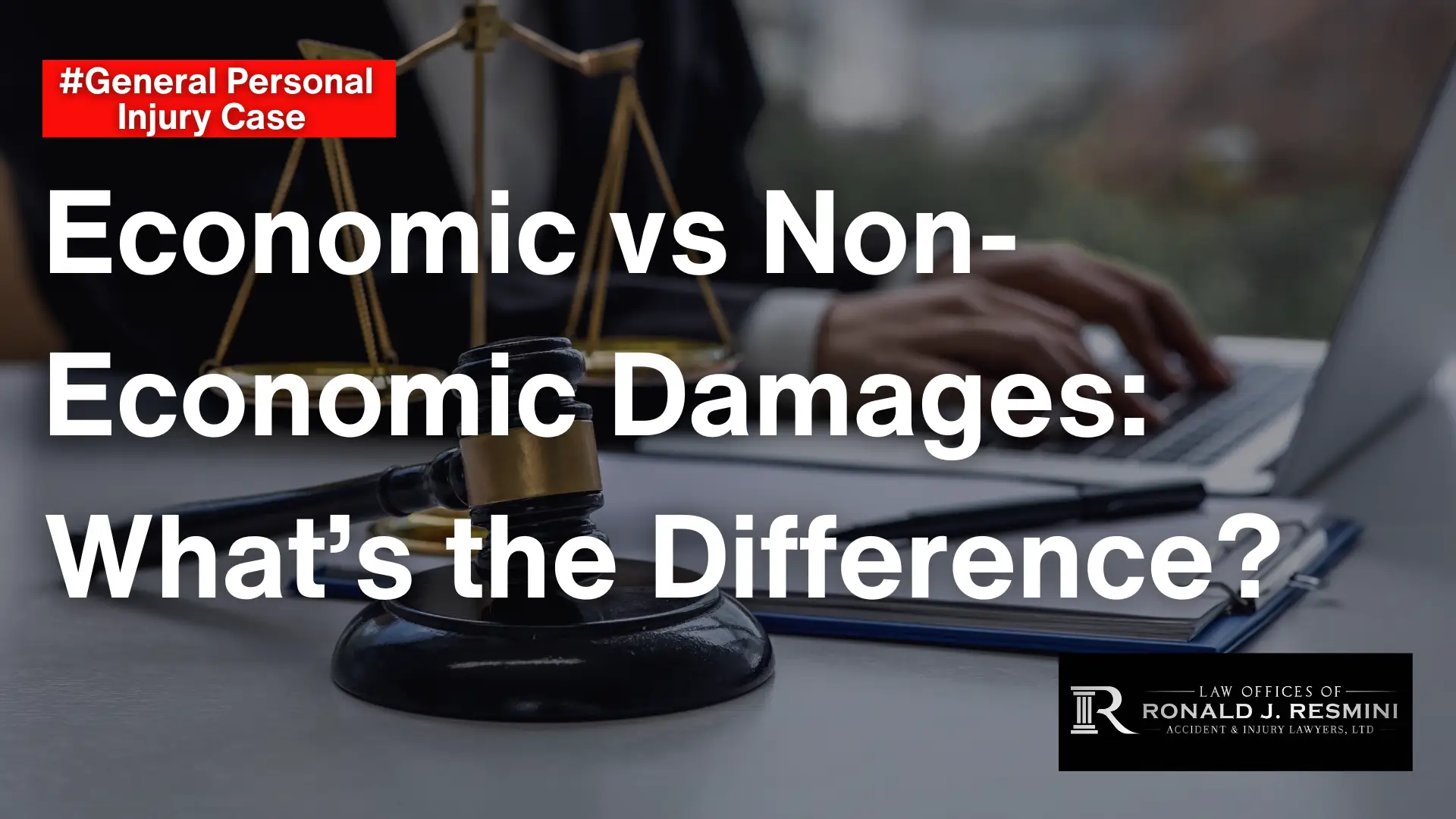 You can seek compensation for your losses when you suffer injuries in an accident due to someone else’s negligence. Many people need to realize that you can pursue two distinct categories of damages, however: economic and non-economic. Don’t know the difference between economic vs. non-economic damages? Understanding the difference between these two types of damages is crucial when filing a personal injury claim.
You can seek compensation for your losses when you suffer injuries in an accident due to someone else’s negligence. Many people need to realize that you can pursue two distinct categories of damages, however: economic and non-economic. Don’t know the difference between economic vs. non-economic damages? Understanding the difference between these two types of damages is crucial when filing a personal injury claim.
Economic Damages
Economic or special damages cover the quantifiable financial losses you incur due to your injuries. These damages have a specific dollar amount and can be proven with documentation such as bills, receipts, and pay stubs.
Some common examples of economic damages include:
- Medical expenses: This includes all the costs associated with your medical treatment, such as ambulance fees, hospital bills, doctor visits, medications, and medical equipment. If your injuries require ongoing care or future medical procedures, you can also seek compensation for these anticipated expenses.
- Lost wages: If your injuries prevent you from working, you can recover the wages you would have earned during your recovery period. This includes your base salary and any bonuses, commissions, or other benefits you may have received.
- Property damage: If your personal property, such as your vehicle, was damaged in the accident, you can seek reimbursement for the cost of repairs or replacement.
- Out-of-pocket expenses: Any other expenses you incur as a direct result of your injuries, such as transportation costs to medical appointments, or modifications to your home to accommodate a disability, can be included in your economic damages.
Non-Economic Damages
What are noneconomic damages? Non-economic or general damages cover the intangible losses you suffer due to your injuries. These damages don’t have a specific dollar amount attached and can be more challenging to quantify.
Some non-economic damages examples include:
- Pain and suffering: This refers to the physical pain and emotional distress you experience due to your injuries. It can include not only the immediate pain you feel after the accident but also any ongoing discomfort or mental anguish you endure during your recovery.
- Emotional distress: Accidents can be traumatic events that leave lasting psychological scars. If you experience anxiety, depression, post-traumatic stress disorder (PTSD), or other emotional issues as a result of the accident, you can seek compensation for these damages.
- Loss of enjoyment of life: If your injuries prevent you from participating in activities you once enjoyed, such as hobbies, sports, or social events, you can seek damages for this loss of enjoyment.
- Loss of consortium: This refers to the loss of companionship, affection, and sexual relations with your spouse as a result of your injuries.
- Scarring and disfigurement: If your injuries leave you with permanent scars or disfigurement, you can seek compensation for the emotional impact this has on your life.
Determining the Value of Your Damages
In terms of amount, how much is the difference between economic vs non-economic damages? When you file a personal injury claim, you aim to recover compensation for your economic and non-economic damages. Determining the value of your damages can be a complex process, however.
For economic damages, the value is typically based on the actual financial losses you’ve incurred. If your medical bills total $50,000 and you’ve lost $10,000 in wages, for example, your economic damages would be $60,000.
Non-economic damages, on the other hand, are more subjective and can vary widely depending on the specifics of your case. Factors that may influence the value of your non-economic damages include:
- The severity of your injuries
- The length of your recovery period
- The impact your injuries have on your daily life and relationships
- The strength of your evidence supporting your non-economic losses
In some cases, attorneys and insurance companies may use a multiplier to determine the value of your non-economic damages. They may multiply your economic damages by a number between 1.5 and 5, for example, depending on the severity of your injuries and other factors.
Working with an experienced personal injury attorney who can help you determine the total value of your damages and negotiate with the insurance company on your behalf is essential. Your attorney can also advise whether to accept a settlement offer or take your case to trial.
Comparative Negligence and Your Damages
If your actions may have contributed to the accident or your injuries, Rhode Island’s statute on comparative negligence comes into play.
Under comparative negligence laws, the percentage of fault assigned to you can reduce your damages. If you are deemed 20% at fault for the accident, for instance, your damages would be reduced by 20%.
Your personal injury attorney can help you understand how comparative negligence laws may impact your case and work to minimize any fault assigned to you.
Punitive Damages: Punishing Wrongdoing
In very specific cases, you may seek punitive damages in addition to your economic and non-economic damages. Punitive damages punish the defendant for particularly egregious behavior and deter others from engaging in similar conduct.
Punitive damages are rare in Rhode Island, as the state places a high bar on their award. An attorney can advise you on whether you have a right to claim them.
Statute of Limitations: Time Limits for Filing Your Claim
It is essential to be aware that there are time limits for filing a personal injury claim, known as the statute of limitations. These time limits vary by state and type of case but generally range from one to six years from the date of the accident or injury.
If you miss the deadline for filing your claim, you may be unable to recover any compensation for your damages. That’s why speaking with a personal injury attorney as soon as possible after your accident is crucial to ensure your rights are protected.
How a Personal Injury Attorney Can Help
 What’s the difference between economic vs non-economic damages? Understanding the difference between economic damages vs non-economic damages is crucial when filing a personal injury claim. Economic damages refer to the tangible financial losses you incur, while non-economic damages refer to the intangible losses you suffer due to your injuries. Determining the value of your damages can be a complex process, and comparative negligence laws may impact your ability to recover compensation.
What’s the difference between economic vs non-economic damages? Understanding the difference between economic damages vs non-economic damages is crucial when filing a personal injury claim. Economic damages refer to the tangible financial losses you incur, while non-economic damages refer to the intangible losses you suffer due to your injuries. Determining the value of your damages can be a complex process, and comparative negligence laws may impact your ability to recover compensation.
If you suffered injuries in an accident, don’t hesitate to contact the experienced Providence personal injury attorneys at the Law Offices of Ronald J. Resmini, Accident & Injury Lawyers, Ltd.. Our team is here to help you navigate the legal process and fight for the compensation you deserve. Call us today at (401) 751-8855 to schedule your free consultation and take the first step toward justice.
